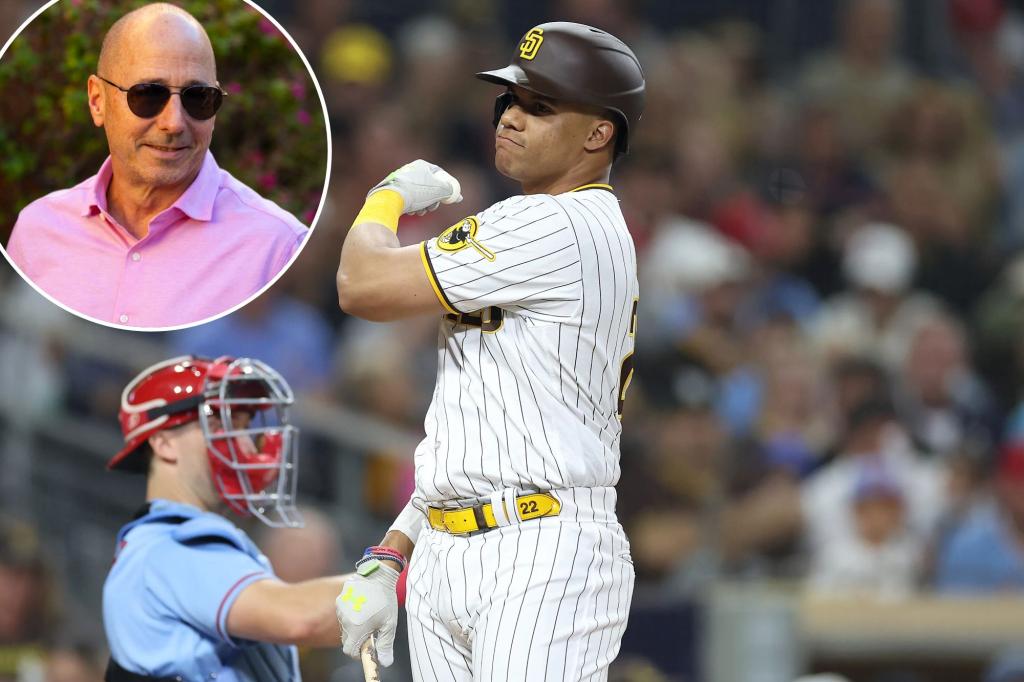The Yankees are pursuing superstar outfielder Juan Soto, and why not? He’s a top-five hitter in the game (which they need after a dreadful year at bat), he’s left-handed (which they also desperately need) and he’s eminently available, at least according to rival decisionmakers of Soto’s San Diego squad.
“They’ve got to trade him,” one rival exec said. “There’s no way they can afford him to keep him.”
The mid-market Padres outspent everyone but the Mets and Yankees in 2023, they admit they need to cut payroll after one of the unluckiest seasons ever and they’ll need to replace no less than five productive to premium pitchers who became free agents, including Cy Young winner Blake Snell and star closer Josh Hader. So if logic finally pairs up with the win-at-all-costs Padres, it makes sense Soto has to go.
But I’m going to surprise you: The Yankees should let Soto go elsewhere.
While he seems perfect at first glance, there’s one obvious issue — his timing stinks.
Soto is a year away from free agency, and the chances to extend him in a window of 72 hours for anything the Yankees would deem reasonable are so slim that they might as well be considered none. The belief is Soto’s agent, Scott Boras, would be happy to listen to extension overtures, but probably only if the interested team saw the market their way.
The question now is whether that’s $500 million? Or maybe it’s $600 million?
We know it’s not $440 million, because Boras and Soto didn’t even flinch when Soto’s original Washington Nationals team put that then-record offer on the table a couple years back. So for reality’s sake, consider Soto a one-year rental.
The question then is whether you want to give up a combination of promising young players for a rent-a-hitter with a likely $32 million price tag via arbitration. One rival GM guessed that Soto would cost an interested team two top-100 prospects (or comparable young players). So for the Yankees, that could mean some combination of Anthony Volpe, Jasson Dominguez, outfielder Spencer Jones and right-hander Drew Thorpe.
Baseball writer Hector Gomez tied the Mets and Giants as well as the Yankees to Soto talks, and I’ll say this: He may make even less sense for those two teams.
Both of them could obviously afford Soto (the Mets have the deepest pockets of anyone, and money has been burning a hole in the pockets of the Giants forever). But the Mets are thought to be targeting 2025 for their World Series dream, which makes a player with one year to go nonsensical, and it’s hard to see Soto signing in San Francisco long term assuming there’s some validity to the belief he’d prefer to be on the East Coast.
As for the Yankees, while it’s tempting to want to combine Soto with Aaron Judge to give the Yankees the game’s most formidable one-two punch — at least for a year — I’d say there’s better option. That’d be free agent Cody Bellinger, who may not hit as consistently as Soto (who does?) but he’s a better fit due to his position, his price and especially his long-term availability.
I’ve seen some estimates for Bellinger range up to $220 million, which is exactly half what Soto turned down. Not only that, he’d fill the center-field spot, which is open, and he’d cost no prospects.
The Yankees could afford to get both players, of course, and I’m not going to argue against that. Just don’t trade for Soto at the expense of Bellinger.
It’s hard to know for sure, but for now it feels like the Yankees might like Soto more than Bellinger. There are a couple of questions being heard about Bellinger, and neither is especially concerning (at least not to me).
One is that his hard-hit rate (31.4 percent, 10th percentile), exit velocity (87.9 percent, 22nd percentile) and barrel percentage (6.1 percent, 27th percentile) all ranked in the bottom third even in a year where he hit .306 and posted an .881 OPS. But I’d answer that by pointing out in two-strike situations he hit .279 (second best in baseball) with a .725 OPS (sixth best in baseball), thanks to an adjustment to put his bat on the ball when he was badly behind in the count. That’s great situational hitting.
The other question I heard, believe it or not, is whether he can play in a big city. I’m hoping this was just a fleeting thought and some odd overcompensation of concern following the Joey Gallo debacle. But I’m here to point out Bellinger won an MVP in Los Angeles and finished 10th in MVP voting this past season in Chicago. That’s a pretty good indicator he can play in New York. It’s certainly a heck of a lot more meaningful than asking Rougie Odor what he thinks.
Source









